Observations about Munich
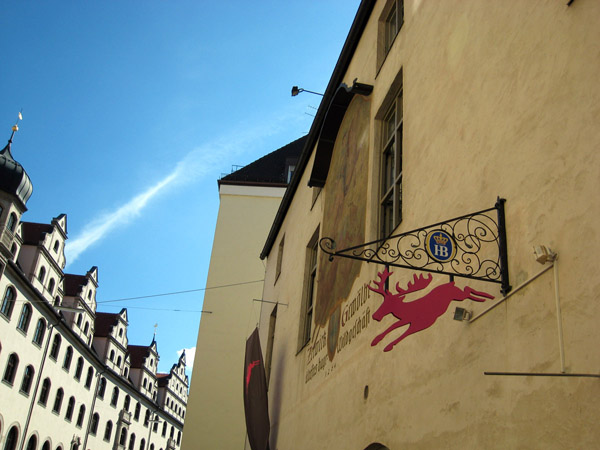
A list I made of some of the things that have stood out to me in the land of lederhosen. My friends who are traveling in South America did this, and I thought it was a great idea. This way I can remember these things in the future as well. Sorry it's so long!
1. Germans say "Genau" (ge-now, or "exactly") to everything. 90% of conversations you overhear will sound like this "Ja... ja, genau. Danke... genau." Gerne (or "I'd like that") is another favorite.
2. No stores are open on Sundays or holidays. Only restaurants and coffee shops are open on Sundays. During the week, most stores are only open until 6pm. The grocery store is only open until 8pm. Most stores close at 2 or 4pm on Saturdays as well.
3. Grocery stores: are usually very small and the aisles are about 4 ft. wide. You will physically bump into at least 2 people each time you go. There are usually only 1 or 2 checkout lanes, and no such thing as a 10-item or less lane. If the person in front of you has 30 things and you have one, they will not allow you to go in front. You have to ask to get a plastic bag at the check-out, and you will pay for it. Most people bring their own tote bags. You also return all your plastic and glass bottles to a machine in the grocery store, where you get your "pfand," or refund. It is a pretty significant refund, so people actually go out of their way to recycle.
4. Items you cannot find in Germany: dryer sheets, vanilla extract, pumpkin puree, creamed corn, bleach for clothes, black beans, cream of chicken soup, hummus. Many other items will only be found at a very select few specialty stores, and will cost a LOT! Such as: marshmallows, macaroni and cheese, microwave popcorn, soft and hard-shell tortillas, refried beans, oriental spices, saltine crackers, most any pre-packaged foods, and many more items I'm not listing. There's also not really "half-and-half" milk; I think there are some fattier versions of normal milk, but haven't really figured out what the equivalent should be yet. There's no such thing as a gallon of milk...and no skim milk.
5. Coffee- you can order a plain black coffee (schwarzkaffee) or a coffee with steamed milk already stired in (milchkaffee), but you won't find a half-and-half or any other milk/cream sitting on a little sidetable anywhere. Don't try to order a coffee with cream- they will look at you like you're an alien and put whipped cream in your coffee. This actually did happen to me. I find cappucinos are the best way of avoiding this issue altogether and getting the best-tasting coffee.
6. Tipping is much smaller % here: a 10% tip is good. You also tell them what you want the final amount to be, instead of just leaving extra. If the bill comes to €21.25, you say back "23 bitte," and they say "Danke," giving you any extra change. A lot of times, like at the coffee shop, you just leave any extra change they give you as tip.
7. There is always an underlying feeling that "there must be order." This is a rule the Germans live by and follow implicitly. As a pedestrian or biker, you do not cross the street unless it's green, even if there are no cars around. Germans do not like "rule-breakers." Bike or pedestrian police will give you a ticket, which is about €85, and you'll pay more if you don't have ID on you either.
9. Most places do not take Visa. People use cash much more often here, or the EC Karte (et-say), which is the German form of a debit card. You have to have a German bank account to get this lovely EC Karte. The Post (office) will not take Visa either.
10. Germans have been known to smile on occasion, but unnecessary smiling is frowned upon.
11. Do not ask to "go to the bathroom," which means you want to take a bath. Ask where the WC (wash closet) or die toilette is.
12. Public transportation here is great. There are bike lanes with their own "bike stop lights." The U-Bahn (subway) is fast, clean, and efficient. The newer U-Bahn and Die-Bahn cars are sleek, modern, and seems like they were designed to feel like a Mercedes inside. Trams on the street are also good, but usually older cars. All train stops will have digital readerboards that tell you how many minutes until the next trains will arrive.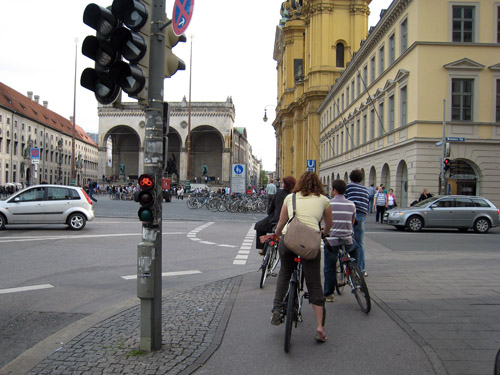
13. "On your honor" has a new meaning here. You are supposed to buy tickets for the trams and U-Bahn, but they rarely check. When they do, everyone has their ticket. People obey the rules and do as they're supposed to. There are no turnstyle, electronic gate systems to let you on the U-Bahn, like there are at the subway in NYC. If they did honor system in NYC, no one would pay. Here, everyone pays.
14. The cars are very very nice here. A typical drive down the street, you'll see 50% Mercedes, 25% BMW, and 25% other cars. Almost all the taxis are Mercedes, and the Polizei cars are BMW's.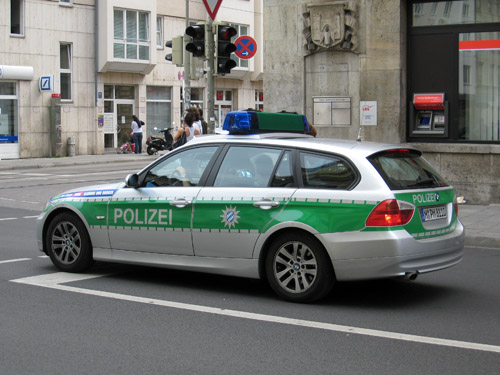
15. It is very safe here. People walk home alone at night and don't think twice. If you lose something, Germans will usually do everything they can to return it to you (instead of steal it). There are no Kryptonite chain locks for bikes- just a simple lock through the back wheel will usually do.
16. Last names are listed on the outside of apartment buildings, and your mail goes to you by your last name instead of apartment number. Many of the houses in the country have the last name painted on the side of the house, such as "Haus Koller" or "Gasthaus Bergland" or "Pension Muntek."
17. Beer, wine, and flowers are really cheap here. Grocery stores carry all three items, and a bottle of weißbier is about 80 cents, wines from Italy (decently good ones) are about €3-10, a bouquet of flowers is about €2.50.
18. Everything else is pretty much expensive.
19. The whole underage drinking vs. autobahn debate. I could write a whole page on this one- we had a big discussion over drinks one night in Kitzbühel. The bar we were at was almost all teenagers, about 14-16 yrs old. It was so weird to be in a public bar with KIDS, and we were the oldest ones! Now, they are allowed to start drinking at a much younger age, so it's not so much of the excessive/rebellious thing to do as in the US. I am amazed that they don't have more drinking and driving accidents, especially when there are autobahns (no speed limit) all over! The main conclusion we came to is that here, it is a PRIVILEGE to drive. To get your driving license costs about €2000, where in the states it's basically free. The insurance is astronomical, the gas even more expensive (converts to abut $9/gallon), and cars are way more as well. When all is said and done, you are spending about 5x as much to drive here than in the states. So those who actually CAN afford to drive take it seriously. Also, the public transportation is much better, so people have other options than driving home.
20. Public bike systems for rent- so great! Call-A-Bike. City bikes also have the integrated light system, where there is a round wheel thing that rolls against your front tire. As you pedal, it rolls opposite of the tire and gives electricity to both the front and back lights (no batteries).
http://www.callabike-interaktiv.de/kundenbuchung/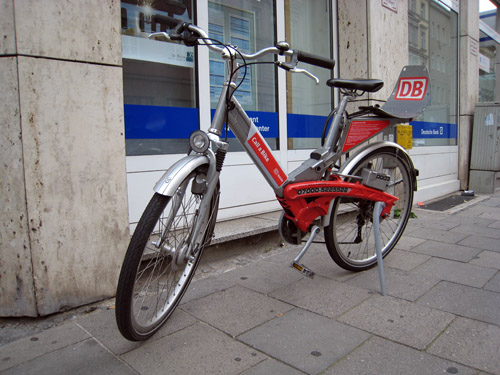
21. ß is called "sharfer-S" or sharp-S, which is the sound of ss, like weißbier (sounds like veiss-beer or vice-beer). Funny that I write that now, it is literally a vice beer to many who drink it. Thick and unfiltered :)
22. Germans take their vacation days and Sundays seriously. You are not to do any work or shopping on Sundays, and there are a ton of holidays. Bank holidays seem like they're every other week- get a calendar to know ahead of time! Impossible to guess when they'll spring up, then no grocery shopping for you! Holidays and vacations are frequent- about a total of 4 weeks a year, and they travel a lot! Traveling around Europe is very easy- jumping on a plane to Spain from Munich is like flying from Denver to Chicago.
23. Why are so many words capitalized? In German, you capitalize ALL your nouns. Took me a while to figure that out, when my German teacher did not explain that one and just seemed to be in love with capitalization. No one told me!!
24. The windows are different here- most do not have screens, and the handles are in the middle of the side of the frame. You can tilt them forward (see photo) or turn the handle to the middle position, which will open it up like a door hinge. Handle turned down=closed. Handle turned horizontal= opens like a door. Handle turned up= tilts forward.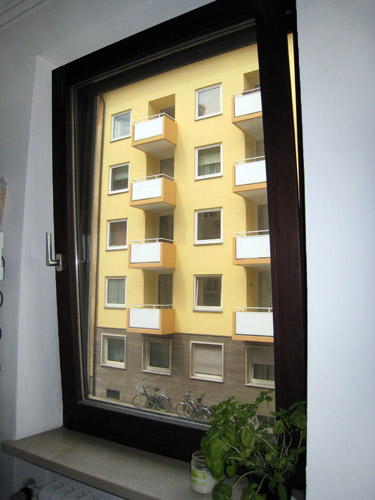
25. In apartments, you are to be very respectful of your neighbors. You should not play music or do laundry past 9 or 10pm. If you are having a party, you have to ask the permission of your neighbors first, or at least let them know and maybe invite them too.
26. Germans are in love with their kitchens. They buy very long-lasting and expensive kitchen goods, like ovens, refrigerators, and washer/dryers (yes, the w/d is usually in the kitchen). They also TAKE these items with them when they move, so you'll have to buy all new items. Even light fixtures might have to be purchased- usually won't come with the apartment/home.
27. Your typical "Walgreen's-type" store will not have drugs. It will have all cleaning items and toiletries (shampoos, soaps, detergents, etc)- the most common chain of this store is called Rossman. Grocery stores do not carry drugs or toiletries either. You must go to an "Apotheke" for your drugs, which are usually all behind the counter. You'll have to tell them either what you need or what your ailments are. They will find some German equivalent (sorry, no Advil here!) and no anonymous shopping for embarrasing items.
28. Girls, there are no tampons with applicators in Germany. Only O.B. tampons.
